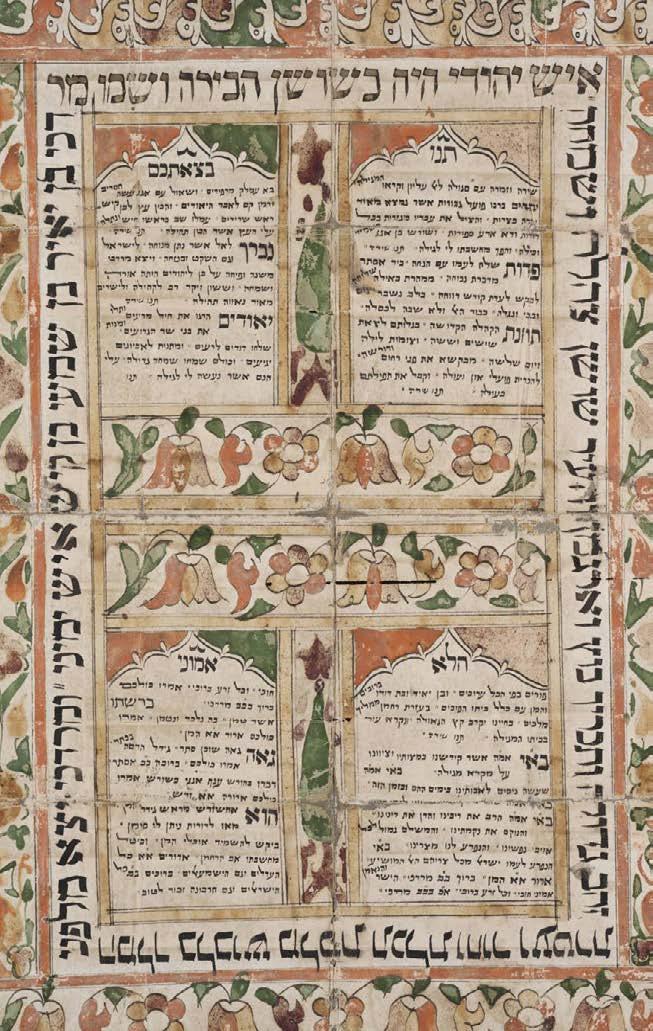
7 minute read
Purim – unmasked customs and costumes
Pur m — unmasked
Customs and costumes
The Meaning
The holiday of Purim celebrates the saving of the Persian Jews from the genocidal plans of Haman. Through the wisdom and grace of Mordechai and Esther and the behind-the-scenes machinations of God, certain death was replaced with victory, security and religious freedom. Because Haman is such an obvious predecessor of Hitler and because the Purim story occurs in the Diaspora, it has the ability to resonate deeply with us. We, too, live far from Israel in an assimilated environment. Though we enjoy great privileges, we recognize that our fortunes could change in an instant under the wrong political or social conditions. We, too, have to seek God’s presence in a world where He is hidden.
Unfortunately, most Jews know little more about the holiday than costumes and hamentaschen. The best solution to this problem is to get involved with learning more about your Judaism (like, say, KJB), so you can learn anything and everything you ever wanted to know about Judaism, its holidays and its values. For starters, though, try reading the following summary:
the story
As told in the Scroll of Esther (Megillat Esther), the Persian Jews who lived in the period between the First and Second Temples (ca. 500 BCE) were nearly destroyed by the nefarious plot of Haman, a descendant of the Amalekhites, who are the perpetual enemies of the Jews. In a drunken rage, the foolish King Achashverosh killed his wife, Vashti. He then selected Queen Esther, a nice Jewish girl, as his wife. She hid her Jewish identity. Haman, infuriated by Mordechai’s refusal to bow down to him, decides to annihilate the entire Jewish people and convinces Achashverosh to send out a decree that all the Jews will be killed on the 13th of the month of Adar. Esther, who has concealed her Jewish identity since she came to the palace now has to summon the courage to take her case to the king. After three days of fasting, she appears in the royal court and invites both Achashverosh and Haman to two parties. When she finally reveals that Haman’s plans to kill the Jews would result in Esther’s death as well, the king hangs Haman on the gallows Haman himself had erected for Mordecai.
Though he still refuses to rescind the genocidal decree, he permits a new decree that allows the Jews to defend themselves, which they do, under Mordecai’s direction. The holiday of Purim is celebrated the day after that battle, celebrating the peace after the battle.
Although the megillah never mentions the name of God, there are subtle references to His involvement in the story. The night before
Esther’s party, the king cannot sleep and discovers (while being read to as a remedy for insomnia) that Mordecai has already saved his life once. This and other nuances show the hand of God subtly influencing events. Mordecai and Esther recorded the story of Purim so that it would live on among the Jews, which is why we still celebrate and read about it today.
The Mitzvot
The Fast of Esther Thursday, February 25 (starts 5:23 am, ends 6:13 pm)
Esther commanded the Jews to fast for 3 days before she appeared before the king to plead for him to cancel Haman’s plan. Luckily for us, we only fast the day before Purim. It is appropriate to have a solemn day of prayer (before Haman’s plans were undone) before entering into the joyous celebration of Purim. Some say we fast on that day because we had to fight a war and lives – both ours and theirs – were lost. We only celebrate the peace, not the war.
The Reading of the Megillah (Scroll of Esther) Thursday Night, February 25 & Friday, February 26
Esther and Mordechai were convinced that Purim was critically important for the future of the Jews and that “these days should be remembered and done in every generation, every family, every country and every city and that these days of Purim should never pass away from the Jews and their memory should never cease from their children.” (Esther, chap. 9) So they petitioned the Men of the Great Assembly to require that the story of Purim be read publicly once a year, as if it were an urgent letter sent from the capital city announcing that we were saved from certain death. In the uncertain times in which we live, it is good to remember and hope that God has our back and will save us from genocidal maniacs.
The Megillah should be heard by every Jew twice, in the evening and morning of Purim. The reading of the Megillah is considered a form of the joyous Hallel prayer (Psalms 113-117) and so Hallel is not said on Purim.
Gifts to the Poor (Matanot la-Evyonim) One of the specific enactments (see Esther 9:22) made in regard to Purim was to give special gifts to the poor (minimum 2 gifts to 2 poor people) so that no person lacked the means to have a special Purim feast. Some have a custom not to turn away any person who asks for
assistance on this day. Some authorities say the mitzva is only fulfilled when the money is given to the poor on the day of Purim itself, so there are special groups that collect money for distribution on Purim day. If you give charity money to any of the KJ Rabbis, we will make sure it is delivered on Purim day.
There is also a custom to give the half shekel, which was a Jewish communal tax given once a year during Temple times. Though both are used for charitable purposes, they should be given separately.
Deliveries of Food (Mishloach Manot) In Esther 9:22, it also mandates that that Jews send prepared foods to their neighbors and friends on this day, to increase the joy and unity among Jews. The minimum requirement is to give two kinds of food (say, a fruit and a chocolate bar) to one person, but many people have the custom of creating elaborate packages. While this is a beautiful idea, there is no need to overdo it.
Purim Feast (Seudah) Jews are known to mark special days with food, so that no spiritual joy should lack its physical counterpart. Esther specifically required that Purim be a day of “feasting and drinking”. The Purim meal should be a complete and lavish one, including bread and the Grace After Meals. It is also customary to make merry at the meal, telling jokes and performing humorous skits etc. It is also among the observances of the day to become too “drunk” to tell the difference between Haman and Mordechai (or two people dressed as them). While some people scrupulously observe this precept, others content themselves with a glass of wine and/or a short nap. While both are legitimate practices, one must surely be aware that excessive drinking carries other serious risks, both as far as transgressing Jewish law and one’s personal welfare.
Reciting a Prayer of Thanks (“al ha-Nisim”) We insert a special prayer of Thanksgiving in the Amida (Silent Devotion) and in the Grace after Meals on Purim day. This prayer summarizes the Purim story and thanks God for allowing Haman’s plans to be thwarted.

the customs
Costumes It is customary to dress up on Purim, because of the theme of “v’nahafoch hu,” that everything was turned upside down on Purim. The Jews were going to be destroyed, but in the end, they were saved. It was going to be a day of mourning and death, but it was flipped into a joyous celebration.
In addition, God’s role is a hidden one in the story of Purim. Though God is clearly in control, His/Her presence is never clearly felt. God is, so to speak, in disguise, using Esther and Mordechai as representatives to channel divine benevolence to the Jews.
In other words, by dressing up, we affirm that God is sometimes hidden in our lives, but that just as we can see behind the costume if we try, we can also see the hidden face of God.
Purim Torah/Purim Shpiel The humor and lightheartedness of Purim is found in intellectual ways as well. Many have the custom on Purim of creating elaborate Purim shpiels, singing funny songs and poking fun at everything in existence. Among some, this resembles Saturday Night Live or standup comedy with a Jewish twist. There have even been several ersatz Talmudic tractates published – such as Masechet Bubbe Ma’aseh (“the Tractate of stories your grandmother told you”) – which look and sound just like regular Talmud, but much funnier.
Wishing you a meaningful and fun Purim! “For the Jews there was light and joy and happiness and glory” (Esther 8:16)


Kurdish Megillah, Public domain, via Wikimedia Commons


